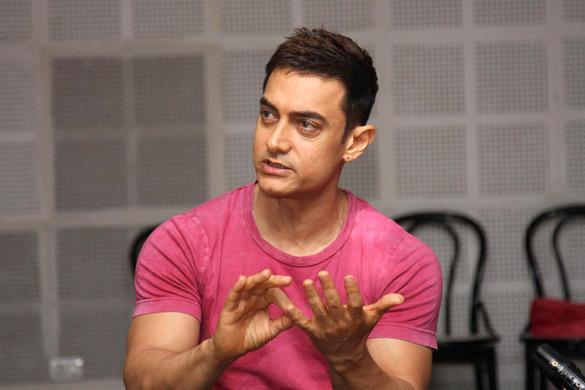Can an Actor Change a Nation?
Indian actor Aamir Khan at a press conference.
The latest issue of Time magazine’s Asia edition features Indian actor Aamir Khan on its cover. While Khan, 47, is a megastar and one of the most popular actors in India today, the title suggests that it is his bucking of Bollywood stereotypes and pursuit of action on social issues that has put him on the cover.
The cover comes on the heels of Khan’s recently-concluded, but immensely popular show “Satyamev Jayate.” The show, part commentary, part talk-show was hosted by Khan himself (his first foray into television) and focused on social issues such as dowry, female feticide, child abuse and medical malpractices.
The show, which reportedly reached a worldwide audience of 1.2 billion through various media, became an instant hit among all classes of the Indian society and had far reaching consequences: Several state governments and the central government set up fast-track courts and passed laws to address the issues raised on the show, the most significant being the strict measures promised by governments against doctors practicing female feticide.
But the show’s biggest win came in the discussion it generated among the citizens of India. The show, which was broadcasted in different languages across the country, was able to break regional barriers and unite people in their demand for action.
But the show isn’t Khan’s first foray into social activism. Considered a thinking man’s actor by critics and fans alike, his films in the past decade have carried a distinct social message. Whether it is the social revolutionary-themed “Rang de Basanti” prompting the youth of the country to serve the nation, or the sensitive story of a dyslexic child in “Taare Zameen Par,” or the commentary on Indian education system in the brilliant “3 Idiots,” Khan has consciously tried to do his bit of spreading awareness about issues.
And not just films, but outside too, he has been open about his views. He was one of the most prominent star supporters of the Anne Hazare anti-corruption movement that swept the country last year and even visited Hazare during one of his hunger strikes. And a few years ago, he came out to speak in favor of the “Narmada Bachao Andolan,” a social movement protesting against the construction of a dam on the Narmada river.
But like in every case, there are skeptics who say that Khan’s moves are precisely calculated and are nothing more than PR exercises, considering the amount of media attention his every move garners. And then there are those who believe that since he demands so much media attention and is so genuinely concerned about the state of the nation, he should consider entering politics.
But Khan remains unfazed by the naysayers and has refused to consider a political move. In a recent interview, he said he would like to continue with his role as an onscreen hero and carry the subtle messages of change through his films.
So, can an actor change a nation? Only time will tell. But he can definitely act as a catalyst of change and Khan sure is doing that.
